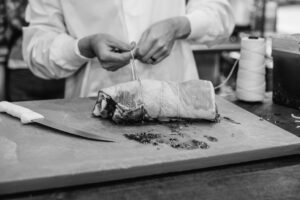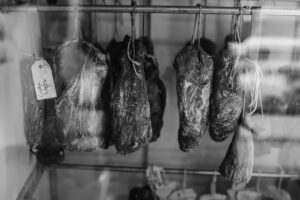
The founder and resident kitchen god at Delmonico’s, “Olympia’s only truly artisan butcher shop,” Brian McDonald, who seems to have found his niche after years gaining experience and honing skills in the culinary arts, the food service business, and related pursuits. He says he got his start at home. “My grandmother taught me how to make a roux when I was four or five, and I grew my own herb garden around that time. In my teens, my palate expanded, and I got into ethnic foods.”

Brian made his way to Olympia, and to Evergreen State College, in the late 1990’s and though he says that working at the Evergreen cafeteria did not refine his culinary ambitions, some of the contacts he made, and the evolving food scene in Olympia, did. Through a fellow student he got his first professional cooking job at the old JJ North’s Grand Buffet on the West Side, and eventually moved upscale to Portofino, not as a cook but in a management role. His résumé includes chef, caterer, and wild food broker.
Along the way, Brian built working relationships with people who grow, harvest, and produce local food, and it’s this network, he says, that forms the foundation for Delmonico’s Heritage Butcher Shop. His very big idea, and his passion, is “to revitalize the local food economy and transform the American food landscape by empowering small farmers and consumers.”
In the shorter run, Brian wants Delmonico’s to be a model of what a truly local food economy can look like when people know where their food comes from, who produces it and how, and who processes it to get it into their hands. In the case of Delmonico’s, this means that fresh, whole, grass and grain-fed cows, pigs, lambs, and chickens are brought in weekly, directly from local farmers, knowing that the animals have been treated well and never subjected to inhumane “processing.” They are then expertly butchered into traditional and custom cuts, and made ready for sale, offering the community not just a product, but “real food, wholesome practices, delicious results.”
Walk into Delmonico’s and have a look around. Just inside the door is a cold case. On the left, shelves full of grocery foods—sundry canned and bottled cooking ingredients and ready to eat delectations. On the right, a place for fresh Wild Yeast bread, and next to that, a case that holds assorted hanging, aging, and curing cuts. On the walls all around are racks full of wine bottles (selected by the legendary Justin Wilkes, of Wine Loft fame). Back to the cold case, there’s an array of beef, lamb, pork, and poultry in various presentations: cut, tied, rolled, stuffed, skewered, crowned, or ground. There is a selection of sausages: breakfast, Bratwurst, sweet and spicy Italian, Chorizo, Andouille, and a favorite, the lamb-rich Merguez, which seem to go out as fast as they come in. Occasionally there will be something out of the ordinary: rabbit, say, or goat, turkey or game birds. On the upper shelves are an interesting cheese or two and a daily display of house-made cold cuts and delicatessen.
All good, all very good. But that’s only what’s showcased on the counter. At any given time in the workspace just beyond there may be two, or three, or even four people engaged in different tasks—butchering, cutting, prepping, washing, cleaning, setting up and breaking down equipment, making sausages, tying roasts. When whole animals, especially cows and hogs, are brought in for butchering, a lot of space and attention are required. But no matter how busy it is, when customers come through the door, someone will immediately step out to see how they can be helped. There’s nothing grudging about being interrupted; the workers are genuinely interested in what brings people in and, if necessary, are happy to help them better understand what it is they want.
What they all want, and what every human body needs, is good, healthy food. Sounds simple, but where to get that? Absolutely not from the industrial, profit-driven “food” production system, which can only offer products, which are, to one degree or another, deleterious to human health and which can never inspire anything but calculations of profit and loss. The craftwork of transformation that happens every day at Delmonico’s by Brian and his crew—Jesse, butcher-in-chief, Kurt, head chef, Brionna, sausage queen, and Owen, Drew, Joey, and Sasha—give us an opportunity to witness the dateless magic of real food. In that vest pocket of a storefront, the words of poet Gary Snyder come to mind: “We are grateful for this meal, the work of many hands and the sharing of other forms of life.” That sounds like another way of saying something to be grateful for: community.
James O’Barr is a life-long carnivore and fine food enthusiast living in Olympia.
Delmonico’s Heritage Butcher Shop at 916 Fourth Avenue East in Olympia is open Tuesday through Saturday, 11 am—7 pm and Sundays 11 am—5 pm. Ask about their new Monday night “Bistro in the Butcher Shop,”a six-course dinner with wine pairing (by reservation only) at (360) 915-9795 or delmonicomeats.com.
Be First to Comment